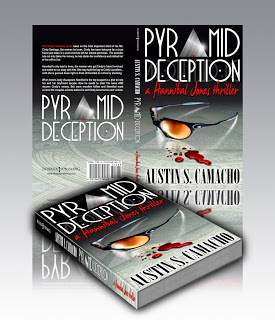Elements of Mystery II

Last week I listed some of the essential elements of a mystery story and asked what you thought was missing. I got quite a bit of feedback and, luckily, all the suggestions do appear in my upcoming novel, PYRAMID DECEPTION. Here are the elements I didn’t discuss last time.
It’s not really a mystery without clues embedded in the story. It’s best to mix them up between material, behavioral and informational clues. Physical clues can be hidden in the setting or the crime scene. Clues can be detected from interactions with the suspects. The best clues are both subtle and clever. But don’t make the mistake of dropping too many clues. If they’re really clues that makes the solution too easy. If there are a lot of false clues readers will resent the artless misdirection.
Readers appreciate the weapon or means of killing, so a physical description of the “how” (how the victim was killed or how the missing item was stolen) is essential. This offers a great opportunity to embed clues so don’t skimp on the description.
I list tension as an essential element because stories without it are boring. There needs to be dissent between the characters, especially between the suspects and your detective. It’s just not realistic for the suspects to happily comply with the sleuth. Detection is more fun to watch if each clue is hard won.
And there must be misdirection, or at least serious distractions. This is where a writer gets into the art of mystery writing. False clues should be woven in with real clues, or tied to a sub plot. They can’t be used gratuitously. Readers will consider that a waste of their time.
Finally, every mystery must have a logical resolution. For your mystery to be satisfying, you must play fair with your readers. They must see all the clues necessary to solve the puzzle, even if they are cleverly hidden. You must not simply pull the solution out of the ether. The readers must have been able to both follow the path and feel that they could have – and SHOULD have – predicted the ending.
For many mystery writers these elements arise automatically as they create their stories. But don’t trust to luck. If you are a plotter, like me, you should make sure all ten of the essential elements are in your story before you begin to actually write. On the other hand, if you are the kind of writer who flies by the seat of his pants you will need to stay aware as you proceed, and not miss the opportunities to include these elements.
NOW… are there other essential elements you feel a mystery needs? Let me know.
Published on August 08, 2015 08:12
No comments have been added yet.



